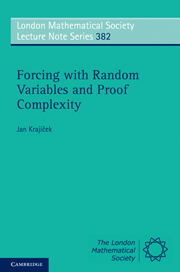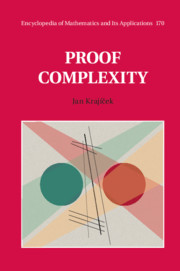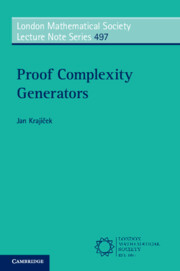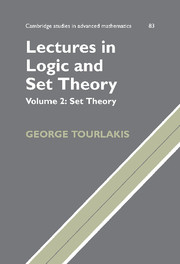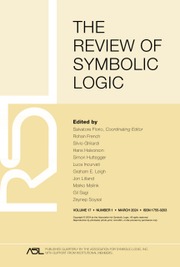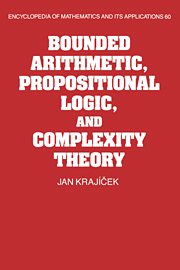Forcing with Random Variables and Proof Complexity
This book introduces a new approach to building models of bounded arithmetic, with techniques drawn from recent results in computational complexity. Propositional proof systems and bounded arithmetics are closely related. In particular, proving lower bounds on the lengths of proofs in propositional proof systems is equivalent to constructing certain extensions of models of bounded arithmetic. This offers a clean and coherent framework for thinking about lower bounds for proof lengths, and it has proved quite successful in the past. This book outlines a brand new method for constructing models of bounded arithmetic, thus for proving independence results and establishing lower bounds for proof lengths. The models are built from random variables defined on a sample space which is a non-standard finite set and sampled by functions of some restricted computational complexity. It will appeal to anyone interested in logical approaches to fundamental problems in complexity theory.
- A brand new approach to problems of complexity theory
- Self-contained so readers do not need to study other material
- Presents some of the most recent developments in proof complexity
Reviews & endorsements
"Jan Krajíček is the leading expert on these problems and in this book he provides a new approach to builing models of bounded arithmetic which combines methods and techniques from model theory, forcing and computational complexity. Personally, I find Krajíček's approach a highly stimulating collage of ideas. I recommend this book strongly to anyone interested in logical approaches to fundamental problems in complexity theory."
Soren M. Riis for Mathematical Reviews
Product details
February 2011Paperback
9780521154338
264 pages
228 × 152 × 15 mm
0.38kg
Available
Table of Contents
- Preface
- Acknowledgements
- Introduction
- Part I. Basics:
- 1. The definition of the models
- 2. Measure on β
- 3. Witnessing quantifiers
- 4. The truth in N and the validity in K(F)
- Part II. Second Order Structures:
- 5. Structures K(F,G)
- Part III. AC0 World:
- 6. Theories IΔ0, IΔ0(R) and V10
- 7. Shallow Boolean decision tree model
- 8. Open comprehension and open induction
- 9. Comprehension and induction via quantifier elimination: a general reduction
- 10. Skolem functions, switching lemma, and the tree model
- 11. Quantifier elimination in K(Ftree,Gtree)
- 12. Witnessing, independence and definability in V10
- Part IV. AC0(2) World:
- 13. Theory Q2V10
- 14. Algebraic model
- 15. Quantifier elimination and the interpretation of Q2
- 16. Witnessing and independence in Q2V10
- Part V. Towards Proof Complexity:
- 17. Propositional proof systems
- 18. An approach to lengths-of-proofs lower bounds
- 19. PHP principle
- Part VI. Proof Complexity of Fd and Fd(+):
- 20. A shallow PHP model
- 21. Model K(Fphp,Gphp) of V10
- 22. Algebraic PHP model?
- Part VII. Polynomial-Time and Higher Worlds:
- 23. Relevant theories
- 24. Witnessing and conditional independence results
- 25. Pseudorandom sets and a Löwenheim–Skolem phenomenon
- 26. Sampling with oracles
- Part VIII. Proof Complexity of EF and Beyond:
- 27. Fundamental problems in proof complexity
- 28. Theories for EF and stronger proof systems
- 29. Proof complexity generators: definitions and facts
- 30. Proof complexity generators: conjectures
- 31. The local witness model
- Appendix. Non-standard models and the ultrapower construction
- Standard notation, conventions and list of symbols
- References
- Name index
- Subject index.

